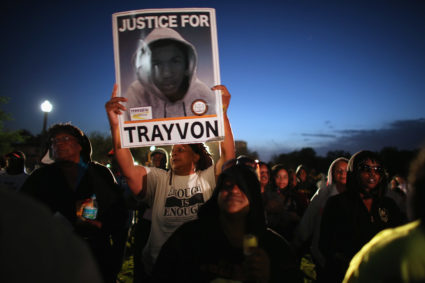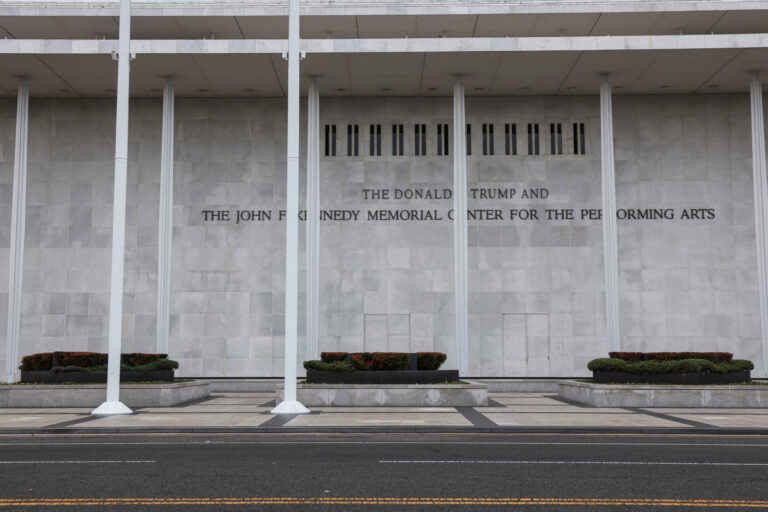
In writing about Trayvon Martin, this poet saw the history of systemic racism
Our July 2020 pick for the PBS NewsHour-New York Times book club is Claudia Rankine's "Citizen." Become a member of the Now Read This book club by joining our Facebook group, or by signing up to our newsletter. Learn more about the book club here.
The first lines of Claudia Rankine's essay, "In Memory of Trayvon Martin," start with an invocation of the history of mass incarceration of African Americans.
"My brothers are notorious. They have not been to prison. They have been imprisoned," Rankine wrote.
To Rankine, it was a nod to Michelle Alexander's book "The New Jim Crow," which lays out how the war on drugs helped shape a criminal justice system that today systematically disfavors communities of color, and Black men in particular. "As a criminal, you have scarcely more rights, and arguably less respect, than a black man living in Alabama at the height of Jim Crow," Alexander wrote. "We have not ended racial caste in America; we have merely redesigned it."
In crafting her elegy for Martin, the Black teen who was gunned down in Florida in 2012 by George Zimmerman, Rankine told the PBS NewsHour she sought to draw on the larger narrative of "terrorization, violence and murder" that Black Americans have faced throughout history, tracking "the years of passage, plantation, migration, of Jim Crow segregation, of poverty, inner cities, profiling."
Read more of Rankine's insight about the essay in the passages below.
From "Citizen"
My brothers are notorious. They have not been to prison. They have been imprisoned. The prison is not a place you enter. It is no place. My brothers are notorious. They do regular things, like wait. On my birthday they say my name. They will never forget that we are named. What is that memory?
The days of our childhood together were steep steps into a collapsing mind. It looked like we rescued ourselves, were rescued. Then there are these days, each day of our adult lives. They will never forget our way through, these brothers, each brother, my brother, dear brother, my dearest brothers, dear heart–
Your hearts are broken. This is not a secret though there are secrets. And as yet I do not understand how my own sorrow has turned into my brothers' hearts. The hearts of my brothers are broken. If I knew another way to be, I would call up a brother, I would hear myself saying, my brother, dear brother, my dearest brothers, dear heart–
On the tip of a tongue one note following another is another path, another dawn where the pink sky is the bloodshot of struck, of sleepless, of sorry, of senseless, shush. Those years of and before me and my brothers, the years of passage, plantation, migration, of Jim Crow segregation, of poverty, inner cities, profiling, of one in three, two jobs, boy, hey boy, each a felony, accumulate into the hours inside our lives where we are all caught hanging, the rope inside us, the tree inside us, its roots our limbs, a throat sliced through and when we open our mouth to speak, blossoms, o blossoms, no place coming out, brother, dear brother, that kind of blue. The sky is the silence of brothers all the days leading up to my call.
If I called I'd say good-bye before I broke the good-bye. I say good-bye before anyone can hang up. Don't hang up. My brother hangs up though he is there. I keep talking. The talk keeps him there. The sky is blue, kind of blue. The day is hot. Is it cold? Are you cold? It does get cool. Is it cool? Are you cool?
My brother is completed by sky. The sky is his silence. Eventually, he says, it is raining. It is raining down. It was raining. It stopped raining. It is raining down. He won't hang up. He's there, he's there but he's hung up though he is there. Good-bye, I say. I break the good-bye. I say good-bye before anyone can hang up, don't hang up. Wait with me. Wait with me though the waiting might be the call of good-byes.
Support Canvas
Sustain our coverage of culture, arts and literature.
















